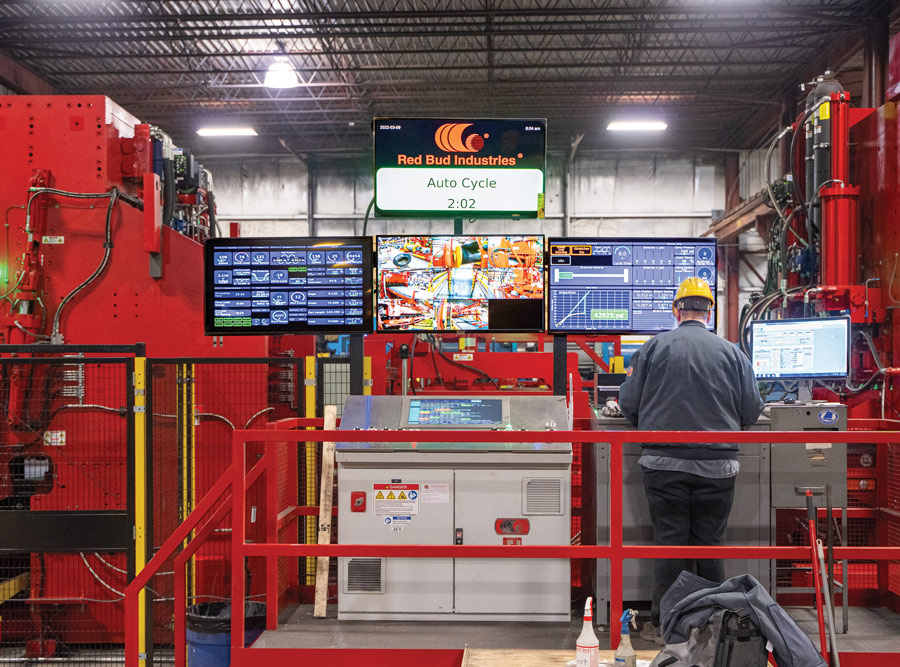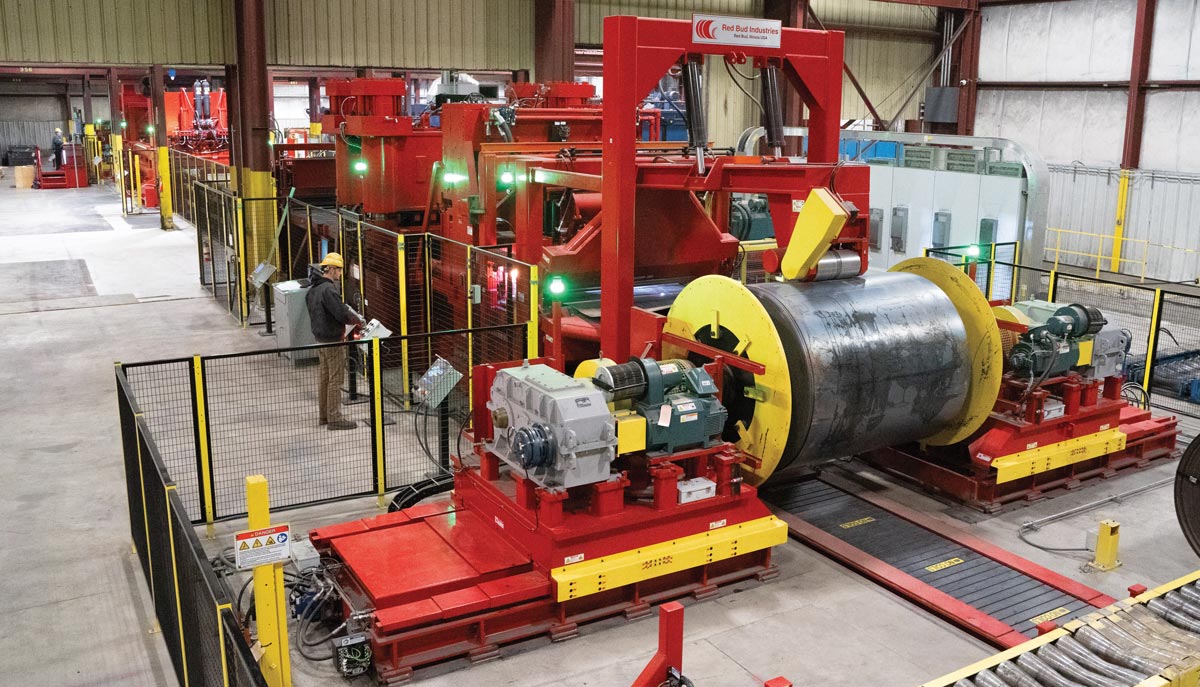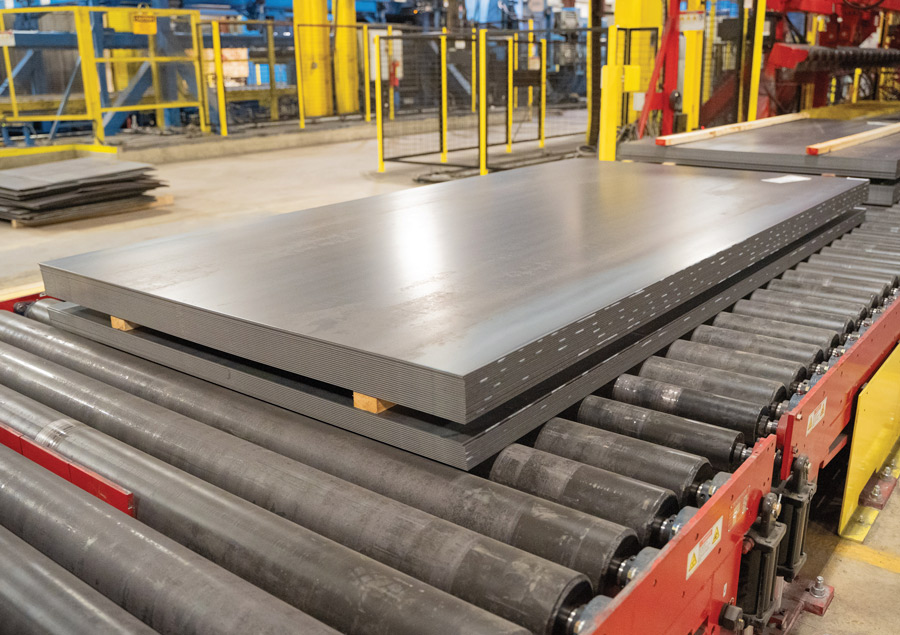
he leaders of MidWest Materials Inc. have been dedicated to the steel industry since 1952 when Joseph Koppelman and two partners founded the company in Cleveland. “My grandfather went to night school and did accounting for various companies,” says CEO Brian Robbins. During the post-World War II era, “people were hardworking and entrepreneurial, so Joe and his family started their own company.”
Robbins’ mother, Noreen Koppelman Goldstein, moved to Cleveland in 1991 to work at MidWest as general counsel after selling steel out of her New York home for 14 years, while raising three children. MidWest Materials’ president since 1996, Goldstein continues to be involved in the day-to-day running of the business.
“My mother is an amazing role model and was ahead of her time,” says Robbins. “She was a teacher and a women’s activist, and earned her MBA and law degree while raising a family and selling steel.” Over half of the leadership team at MidWest Materials are women.
“We’ve had a lot of family members in and out of the business,” Robbins recalls. “I was recruited and said ‘no’ many times.” He practiced law in New York City before heeding the call of the steel industry (and his mother and grandfather) to join the family business. After a couple years tinged with doubt, “I felt like I was making more of a difference in the steel industry than in a law firm. I realized what a wonderful community Cleveland is, and saw boundless opportunity in the manufacturing world. I was lucky to learn from grandparents, uncles and cousins, and I still get to work with my mother and brother.”
Robbins helped to expand the service center’s footprint to 240,000 square feet, and the executive team continues to deploy resources toward employees, equipment, facility and technology despite economic crises, political climates and supply chain challenges.

The pandemic is another crisis that MidWest Materials is managing through transparency, communicating information to employees, vendors and customers. “It’s important to be transparent with information and assuage fears.”
Robbins created a COVID-19 task force early in January 2020 to face the unknown challenges that the pandemic might create. “We wanted employees to know they came first; we considered all possibilities to eliminate fear and keep them safe. While many companies were laying employees off and reducing hours and wages—either out of necessity or fear of the unknown— MidWest maintained wages, issued bonuses and provided employees with a safe and stable work environment. That was a big help to everyone’s families that I think was well appreciated.”
Now, he says, it also means being flexible and providing remote working opportunities when possible, offering competitive wages, and “reminding the world that working in manufacturing is very stable, highly successful and extremely sexy.”
The campaign has worked internally. “We have a growing team of leaders who are all younger than me,” says Robbins.
“We purchased our first stretcher-leveler about 10 years ago and it focused on wide, heavy-gauge, high-strength hot-rolled and hot-rolled pickled and oiled. Customers had increasing quality demands as they were moving to precision and high efficiency manufacturing methods,” Robbins says.
 [we want] to remind the world that manufacturing is stable, successful and extremely sexy.
[we want] to remind the world that manufacturing is stable, successful and extremely sexy. 
An early-model stretcher MidWest Materials had, says Robbins, was “like a medieval rack. Bear claw clamps would pull one sheet or plate at at time in opposite directions until the memory was eliminated. That was a great machine to help in the times when [roller] levelers couldn’t get the steel flat enough, but it took an entire day to run a truckload of steel.”
This technology became too costly and labor intensive to meet growing demand for flat steel. Newer stretch-leveling systems provided an efficient way to provide memory-free steel that was sure to be required more in the future, he says. The company commissioned a Leveltek-Delta stretch-leveling system, the largest in North America at the time, managing steel up to 5/8 inch thick and 101 inches wide. “We could process a truckload of memory-free steel in under an hour. It definitely made us sexy.”
Early in 2019, the company considered the new technologies that mills were using to create thicker steel and reviewed the expressed needs of some of its larger customers for an increased number of tons and the continued need for cleaner, memory-free steel. “We were becoming busier, our lead time began to extend and our equipment was aging. So it was the natural course to research what upgrades or additions were needed to become a better distributor for the mills and to improve quality and output for customers,” Robbins says.
The line includes a continuous stacking system and a brush and vacuum system to clean the surface of the coil of scale and carbon dust. “Customers like a clean surface, and it also creates a cleaner warehouse,” Robbins says.

Safety is critical and a regular focus at MidWest, according to Robbins. “We want everyone to feel safe in the workplace. Not everyone is familiar with a manufacturing shop—the heavy coils, the noise, overhead cranes, etc. Red Bud also emphasizes safety,” he says, adding that Dean Linders, vice president of sales and marketing at Red Bud, “is super easy to work with. His team helped us improve our thought process about safety.”
At the same time MidWest was installing the Red Bud line, it also installed two new high-speed 40-ton cranes in its receiving bay and a high-speed 15-ton crane at the finish end of the line to match the processing speed and avoid potential breakdowns of existing cranes.
Robbins anticipates that more customers, as they learn of the additional capabilities MidWest Materials offers, will realize the higher efficiencies and the ability to match demanding applications and serve markets with growing needs.
Despite dire threats to the marketplace—“we are dealing with unmanageable events like war and a pandemic”—Robbins says he’s confident MidWest will not only survive but will also succeed, especially with a committed team, great relationships within its supply chain, expanded capabilities and consistent capital investment.
“It is essential to anticipate and face challenges head on. It leads to new opportunities. It’s important to continue moving forward and to always invest in equipment and people. That’s why we have succeeded for 70 years. That’s what makes us sexy.”
Red Bud Industries, Red Bud, Illinois, 800/851-4612, redbudindustries.com.